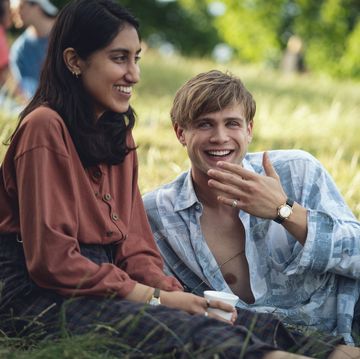There's this beautiful scene in A Ballerina's Tale, the documentary about Misty Copeland out today, in which Copeland marks dance steps in perfect synchronization with one of her mentors, Raven Wilkinson. Wilkinson, 80, was the first black dancer to join the Ballet Russe de Monte Carlo in the '50s; Copeland, 33, became American Ballet Theater's first black principal dancer last June. There are many years between the two ballerinas, but their sisterhood is clear–the lack of diversity in classical ballet hasn't changed dramatically from Wilkinson's time to now, after all. A Ballerina's Tale, directed by Nelson George, chronicles Copeland's rise to success past barriers like race, body-image issues, and a late start in dance at 13. It beautifully weaves scenes of her history-making performances, rehearsals, and personal journey with insight from other black women, her supporters and fellow pioneers.
The movie is another milestone in 2015 for Copeland, who in addition to being named a principal dancer with the ABT landed a Time 100 cover in April, made her Broadway debut in On the Town in August, and continued to inspire as the face of viral Under Armour campaigns. We sat down with Copeland and George to talk about the movie, what Copeland has in common with Ronda Rousey, dealing with increasing fame, and whether she'll turn her Broadway fling into a recurring thing.
Misty Copeland: It's my favorite part of the whole documentary, the end. I always get teary eyed.
Copeland: I feel like, growing up I never really understood or had that type of support where I knew what it meant and how much further I could go if I had it. When I met Raven, it was like this awakening. It was really crazy when I heard her story. It set me on this new mission that I didn't even really understand at the time. She was a mentor in my life even before I met her. She gave me a whole new respect and outlook for how I approached my career and how I valued it as well. I've learned over time now how important it is to have that, so I definitely try to give what little bit of myself I have left to the dancers that I mentor.
Copeland: I think body-image issues are not just a dancer thing. I think we're much more in tune and aware because the body is our instrument and art and we stare at ourselves in a mirror all day, but I feel like it's something that every woman experiences and every girl experiences. I wanted people to see the difficult side of my story. I wanted people to know I haven't always been this perfect or strong ballerina that people see me as,with Under Armour, for example. You need support to get to this place of confidence that I'm at now. But I do think Under Armour is setting a new example for what a ballerina is, and that you can be feminine and an athlete and represent what a woman is at the same time.
George: What's funny to me is that Misty has emerged at the same time as Ronda Rousey with the idea of the athletic woman, the fit woman, as sexual, as alluring, as not just a waifish girl, but a girl who can handle herself. I think there's an interesting thing with Rousey and Misty emerging at the same time in our culture–there's this idea of a new kind of woman's body. I feel there's a zeitgeisty thing going on with this idea. Misty's impact will really be felt in the next 10 years–it's going to be the five-, six-, seven-, eight-, nine-year-old girl who sees her, who grows up with her as a normal image, who will then move forward in ballet and in the world in general.
Copeland: I understand there's a lack of diversity as well in that space, but my experience was that it was incredibly inviting. Everyone involved in it, they wanted me to win, which isn't always the case when you walk into competitive arts or athletic places. But it was one of the most difficult things in preparing mentally and emotionally for because it was so far outside of my realm of anything I've ever done. I never sang before. People think, Oh, you're onstage and you're dancing, so it's not that different! But I wasn't doing ballet, I was doing a different genre of dance. I learned it in two weeks, I had to sing, and I had to act and memorize lines, and that was terrifying. I don't remember the last time I stepped on to stage and was, like, I don't know what's going to happen! That's how it was. The first show I feel like I blacked out and I woke up, and it was over and oh my God, everyone was clapping! Then it got easier as the show [went] on.
George: I always tease her by telling her one day she'll have her own Broadway show. Everyone sees it but you!
Copeland: I feel like with On the Town it was the perfect production and the perfect opportunity. It was made for a ballerina, I was off from ABT at the time, and it was just the perfect storm. I mean, I got lots of offers after that for Broadway and I'm just not interested. My career is my focus. Ballet is my focus.
George: I didn't say next week!
Copeland: No, I mean, maybe in the future! That, to me, is more tangible than movies.
Copeland: Just breathing and staying calm. I'm not going through the steps. That doesn't happen in those moments—you're so prepared and it's so ingrained in your muscle memory, so you're just breathing. Every time I step off the stage I'm just trying to maintain a steady breath before I enter again, just calm and focused.
George: Those are some of my favorite moments as well. That's what no one sees. Sometimes I'm asked to cut them shorter and I'm like, 'No!'
Copeland: I don't feel like my life is that of a superstar! Every day I wake up, I take the train, I go to my ballet class. My everyday life is pretty normal. It's only after hours when I go to do this interview, this photo shoot, then it's crazy. But otherwise I feel like I'm so normal. Eating cookies. Walking down the street with no makeup on.
Copeland: Ballet. Seriously. I feel like going to class every morning is so humbling. You're always working to improve, and you're always being critiqued on your next performance. It's not about what you've done. There's always room to grow.
Words by Kristina Rodulfo
From ELLE.com












